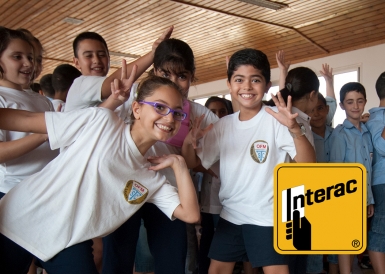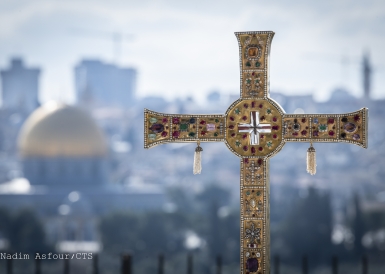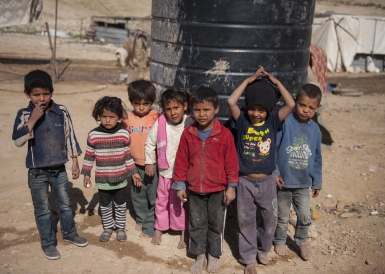
Halfway between an encyclopedia and a data center, Usama knows all the numbers, all the problems,
and wants to think of solutions to help his community.
Under the auspices of the Pontifical Mission in Jerusalem, Usama Salman is working on a plan, through education and career guidance, to strengthen the Christian presence in Jerusalem, which is threatened with extinction. A titanic and very lonely task.
By Cécile Lemoine
If Usama Salman were described, he would appear as a clever mix of social worker and strategy consultant, entirely devoted to the Christian community of Jerusalem. With a slender body, slicked-back white hair and thick dark glasses, this Christian born and raised in the Holy City, dedicates his life and work to one goal: to prevent the disappearance of Christians from Jerusalem. From his office in the Old City, he pessimistically observes: "In 1922, there were 14,669 Christians in Jerusalem out of 62,000 inhabitants. According to the survey I conducted in 2023, there are now fewer than 10,000 of us out of a million inhabitants. At this rate, and within 50 years, Christians will have disappeared from the city." His gaze clouds. "Close your eyes for a moment. Imagine. What would Jerusalem look like without local Christians?"
He also asks this question of the heads of the Churches -- to sound the alarm, to raise awareness. "I want to open their eyes, because the absence of a local Christian community will affect the entire Church, as well as all aspects of Christian life: religious, cultural, social, economic, even its security ..."
The problem of the disappearance of Christians, however, is not new. "We have traces of this trend since the Ottoman era. Since 1967, everything has accelerated. The Israeli occupation and the socio-economic hardships it causes are pushing Palestinian Christians abroad, in search of a better future for their children," Salman said. Each new period of tension is accompanied by its share of departures: "I know that many from Jerusalem have emigrated since the beginning of the war."
Faced with the situation, he does not allow himself to be disheartened. On the contrary. He is looking for solutions. Methodically. After studying biblical archaeology and then international relations, Usama turned to philosophy after a detour as a tour guide. He dedicated his thesis, completed in 2017, to [his] people: "I focused on how we can build a new generation of Christians through a strategic program." The idea? "To find out what the real problems of Christians in Jerusalem are, to analyze them one by one, and to come up with a strategic solution." The result: a multitude of problems identified, ranging from the absence of political leaders, to the separation wall, to a declining birth rate, or to the inaccessibility of housing; and a 360-degree program to solve them. The first of its kind.
From Theory to Practice
Its guiding principle is based on one concept: to strengthen the Christians’ sense of belonging. According to Usama Salman, this is the essential starting point: "Palestinian Christians do not know their history. If you do not know what this land is made of, or where you come from, you lose the sense of your presence here and you leave," says the researcher. He continues: "I don't blame the community, but the education system. I have analysed all the curricula of Christian schools: there are 600 years of history missing, all the first years of Christianity! They teach religion, but not history," regrets Usama Salman, who points to a discrepancy with Judaism and Islam: "The question of the land is central, but we, Christians, only talk about faith."

No more recess.
The Schmidt School, one of seven Christian schools in East Jerusalem, where
Usama Salman plans to launch his history of Christianity classes.
His work, recognized by the Pontifical Mission for Palestine where Usama Salman worked for a time, has found the necessary support to move from theory to practice. Under the leadership of this institution founded in 1949 by Pope Pius XII and thanks to the support of the John Paul II Foundation, presided over by the Franciscan Ibrahim Faltas, a structure has been set up, "Koinonia-Jerusalem", a program where the researcher has carte blanche to implement his strategic plan. He is currently working on a textbook outside the curriculum to revolutionise the traditional teaching of religion in the seven Christian schools in Jerusalem. "In the meantime, we have people who give Christian history lessons to all the students in second, first and final year, treating of everything since Pentecost." Usama Salman knows that the fruits of these courses will not be visible for 4 years. It hopes to reach 1200 young people.
A question of priority
Rational and pragmatic, the researcher wants to think of every possibility for these young people, this new generation in which he is placing so much hope. Once they leave school, Usama Salman wants to guide their careers. "We have built a test that makes it possible to detect which subjects and areas interest students. From the results, we can point to the specialization needed in the Christian and Jerusalem labor market ... Today, all young people want to become engineers, but no one specializes in fields where there is a need, and no one can find a job," sighs the researcher. "If we were to direct engineers towards renovation, it would be ideal: you create a sense of belonging, because you will have to work at the Holy Sepulchre, for example, or in one of the 77 chapels or churches in the old town," enthuses the researcher, who sees comparable advantages as the solution to the socio-economic ills of Christians.

Christian pride
Orthodox Passover celebrates the Christian identity of Jerusalem's Old City,
although every year restrictions imposed by the Israeli police increase.
Convinced of the rational and pragmatic soundness of his vision, Usama Salman hopes to convince church leaders and Christian organizations in Jerusalem to help him work on the implementation of this strategic plan. This is the equivalent of a change to new computer programs for these institutions, which are more used to accomplishing "projects" in the short term. If he is so focused on the future of Christians in Jerusalem, it is because Usama Salman believes that the Christian community is too fragmented for its response to be uniform. "We are experiencing an identity crisis today. A Christian from Israel does not live and think the same way as a Christian from Palestine, or from Jerusalem. The Israeli occupation has divided us, and each one has its own problems, which require its own solutions."
The Pontifical Mission for Palestine: At the Service of All
It all started in 1949, following the tragic moments which followed the creation of the State of Israel, when thousands of Palestinians were expelled from their homes and became refugees. Among them were also many Christians. "At the time, the Holy See was among the first of institutions to respond to the tragedy. It was supposed to be a temporary mission but, unfortunately, we are still here because 75 years later the conflict between Israelis and Palestinians continues," says Joseph Hazboun, its current director. Today, the Pontifical Mission in Palestine works with people of different faiths to create jobs, train young people, provide care, and encourage interreligious dialogue. Since the beginning of the war in Gaza, the institution has also been trying to provide financial and humanitarian support to Christian parishes in the north of the enclave.



